UN ‘very troubled’ over mass trial of Hong Kong democracy activists
Share

Photographers take pictures of members of the League of Social Democrats scuffling with police outside the West Kowloon Magistrates’ Courts ahead of the national security trial for the pro-democracy activists in Hong Kong, Feb. 6, 2023.
United Nations human rights experts have expressed concern over the ongoing mass trial of 47 democracy activists under Hong Kong’s draconian national security law, while a report has emerged that Tiananmen vigil organizer and human rights lawyer Chow Hang-tung is being singled out for harsh treatment in prison.
“We are very troubled about the use of mass trials in national security law cases and how they may negatively affect safeguards that ensure due process and the right to fair trial,” the experts said in a statement dated Oct. 9.
“The charges appear to seek to punish statements allegedly made by each individual criticizing the Chinese government’s policies and their activities in support of democracy in Hong Kong,” the experts said.


More than 10,000 people have been arrested and at least 2,800 prosecuted in a citywide crackdown in the wake of the 2019 protest movement, mostly under public order charges, while at least 230 have been arrested under the national security law, which criminalizes public criticism of the Hong Kong and Chinese governments, as well as ties and funding arrangements with overseas organizations deemed hostile to China.
According to the U.S.-based Hong Kong Democracy Council, 1,618 of those defendants are classed as political prisoners – peaceful critics of the government.
The 47 defendants in the ongoing “subversion” trial include former elected legislators, activists, social workers, academics, trade unionists, and journalists who organized and stood for election in unofficial primaries in July 2020, the U.N. statement said.
Arrest warrants, disbarment proceedings
The U.N. experts also took issue with arrest warrants and bounties targeting eight prominent overseas Hong Kong activists, who are currently based in Australia, the United Kingdom and the United States, and have been accused of breaking the law while in exile.
Professional bodies have also begun disbarment proceedings against barrister Dennis Kwok and lawyer Kevin Yam, they said.
“The complaints of professional misconduct against barrister Dennis Kwok and lawyer Kevin Yam appear to be aimed at preventing them from exercising their profession without intimidation, hindrance, harassment, or improper interference,” the experts’ statement said.
“China should review its National Security Law to ensure that the law is in compliance with China’s international human rights obligations with respect to … Hong Kong,” they said.
“We stand ready to engage in dialogue with Chinese authorities on this very important matter,” said the statement, adding that U.N. Special Rapporteurs Margaret Satterthwaite, Fionnuala Ní Aoláin, Clément Nyaletsossi Voule and Irene Khan have been in contact with the Chinese government.


Australia-based exiled democratic lawmaker Ted Hui, who is one of the eight wanted activists, said the authorities have also been targeting their family members back in Hong Kong, a point that was omitted from the experts’ statement.
“The families of six out of the eight of us have been badly harassed,” Hui said. “Some were taken away to the police station for questioning in the early morning.”
“The United Nations represents most countries, and they have the very clear and strong view that this is a violation of human rights, that it is a kind of political suppression … silence dissenting and opposing voices,” he said.
“It doesn’t matter how much political propaganda it carries out in Hong Kong or China — [the Chinese Communist Party’s] lies won’t deceive the whole world.”
A Hong Kong government spokesman said it was inappropriate for anyone to comment on the trial while it is still under way, that the experts had “completely ignored the facts,” and that the authorities had a responsibility to bring the eight activists to justice.
Chow awaits trial
In a related development, Hong Kong Tiananmen massacre vigil organizer and human rights lawyer Chow Hang-tung is being held in solitary confinement while awaiting trial for “subversion” under a draconian security law, a fellow activist has said.
Chow, who has already served a 15-month jail term for “inciting” others to take part in a now-banned vigil for the victims of the June 4, 1989 bloodshed, is currently awaiting trial for “inciting others to subvert state power.”


“The queen was sent back … to solitary confinement,” fellow vigil organizer Lau Ka Yee reported on her Facebook page on Oct. 7, after visiting Chow in prison.
Lau said Chow has been sent to solitary once in June, twice in July, once in August and once in September, for anything from seven to 14 days at a time, and has complained that the cell is very hot, a problem already flagged by activists earlier this year.
“What’s been happening these past few months really calls into question the [Correctional Services] Department‘s approach to political prisoners,” Lau wrote. “They get the harshest treatment.”
She added: “This time has really changed her — her lips are chapped and she has gotten so thin she looks like a Barbie doll … but her mental state is still healthy, and her stubborn insistence on always choosing the path of good is still strong.”
In solitary, Chow is denied any books except religious scriptures, Lau said, calling on supporters not to bring her snacks but news when they visit her.
Solitary confinement cells in Hong Kong’s prisons are known as ‘water canteens,’ and measure just seven square meters. They are usually reserved for those who disturb prison order, or those who request protection from other inmates, according to the overseas-based news site Photon Media.
The report comes as official figures show that the Lai Chi Kok Reception Centre, one of the biggest remand centers in the city, is already full, with the government expecting a “growing penal population” in the years to come, according to an official document submitted to lawmakers in July.
Translated by Luisetta Mudie.







